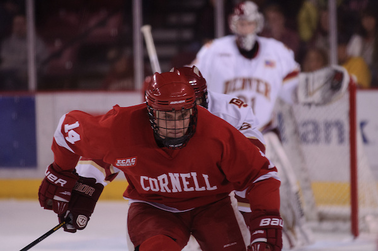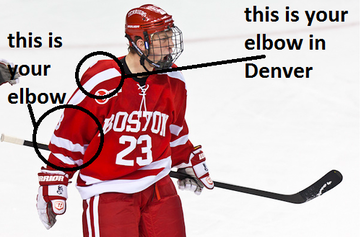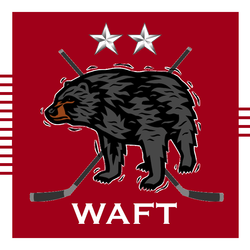Denver won the first game. Overwhelmingly. Any Cornell fans who saw no good in that game are overly pessimistic. There were crucial holes in the game that Cornell played, but a great deal of the effort was good and proportional to the great task it is to be a very talented Denver team. The offense generated was stellar. Cornell controlled the flow of the game and in terms of every statistical measure except the scoreboard, Cornell dominated the game offensively and defensively. Denver spent most of the game defending in its own zone. The Pioneers were unable to stifle Cornell's offense from moving the puck seamlessly in the Pioneers's defensive zone. How did Denver win if Cornell was the more dominant team?
The reason was between Denver's pipes. Juho Olkinuora staved off the Big Red onslaught. Despite the final score of 5-1 in the first game, Cornell's defense, as Denver's Gwozdecky admitted in post-game interviews after the second evening, was just as spectacular the second night as it was the first. Cornell's work against Denver was beautifully in contradistinction to the collapses that allowed Denver to rout Boston University just a week prior. Cornell defenders gave Denver almost no open ice in front of Iles. Denver registered its shots but most were forced to be taken from bad angles. The Pioneers had few passing lanes.
Cornell was still very much in the game when the score reached 3-1. Cornell responded with generating some of its most threatening chances and seemed poised to convert. The Big Red pressed while trying to close the two-point deficit and its defensive game predictably became more open. Denver converted and the game became out-of-reach for the Big Red at that moment considering the dynamic of the game until that point.
The major area for improvement that Cornell needs to prove its national caliber is penalty killing. Three of Denver's five goals were power-play goals in the first game. Cornell's effort the second night proved that the penalty-killing prowess of Cornell from the first weekend of the season is not all lost. Cornell allowed no power-play goals during the second game despite having to kill off two majors and being punished with 76 minutes of penalties. There will be more below on the latter point. Cornell found itself in the reverse vantage point from which it is accustomed to enjoying. The first game saw a team win whom the opposition dominated entirely but whose superior goaltender kept them in a game that it had no business of winning. Denver had the better goaltender the first night. Olkinuora won the Pioneers the first game.
Iles, not one to stand for being outdueled, proved during the second night that he was more than equal to the challenges of the vaunted Denver Pioneers offense when he elevated his game as the Faithful have seen him do. Iles was the better goaltender the second evening. There is no doubt about that. He helped Cornell kill off 36 minutes of penalties within the game including two five-minute majors. He proved that in dire situations that the goaltender is one of the most important penalty killers. Like Gwozdecky said, Cornell did little different defensively the second evening. It was Cornell's Iles who helped ensure that the Pioneer barrage did not convert. Iles allowed only two goals on 36 shots. Performances like this will be important for later national success. However, for those doubting, Iles proved again that he was up to the task.
It has been neither Iles' stellar performance nor the result of the series that has received most attention from fans of both programs and across the college hockey world. The end-of-the-series exchange between the two programs and then Schafer's interview with a USCHO contributor have sparked considerable comment online. It is foolish to wade into such affairs but considering some Pioneer fans have decided to comb through WAFT and comment insultingly before any opinions have been posted on this medium, it is only appropriate that our views be heard. To give proper framing, I will begin with Coach Schafer's comments after the second game.
The lack of replay or review became even more suspicious later in the game. Two apparent Cornell goals occurred without review. One was of such a manner that even the broadcasters marveled at how a puck could hit under the top crossbar of the net and then fall in a manner that would not amount to a goal. A goal occurs when the puck crosses the plane of the goal line. So, by its very nature, if the puck struck the bottom of the cross bar that is directly above the goal line it is almost certain that the puck broke the plane. The WCHA officials, apparently endowed with superior skills of observation, needed not review to verify their knee-jerk reaction. Strangely, these skills of superior observation vanished when Iles made an even more apparent save on a Denver shot and scrum, but review was needed, according to the WCHA officials. The conclusion: the puck had not crossed the line. The difference between the two scenarios? We know that Denver's goal did not cross the goal line but we do not know about Cornell's two goals. Had the WCHA officials been consistent in which goals they chose to review and not, I would have been less suspicious.
The fun was not done. The Pioneers were deadlocked headed into the second period. Then, senior captain Erik Axell was called for contact to the head. So, Denver was given the man advantage for another five-minute major as Axell was removed, to join Tiitinen in the locker room, having drawn a game misconduct. Cornell treated this five-minute penalty kill like it had the 11 minutes of penalties prior that the WCHA officials had handed out. Denver generated next to nothing on its resulting power play. The Pioneers were flat during this span. One of the few times that they did not threaten Cornell in the slightest over the weekend.
Denver then won the game outright after an anomalous Cornell defensive error led to a three-on-two opportunity for Denver and the Pioneers converted to tally the game-winning goal. Schafer in the above interview gives entire credit to Denver for the win and the game-winning goal. He compliments Gwozdecky as well. The two coaches but exchange praise. Denver fans who have commented on almost every platform online that is possible (how they have such time, we may never know) have characterized Schafer's comments unjustly.
Schafer was not even so bold as this post to state that the uneven officiating may have tilted the balance in the second game. The coach that Cornell proudly calls its own criticized the awarding of 40 minutes of penalties to Cornell after the final whistle.
I will refrain from commenting on the handshake exchange because it is foolish for anyone to comment on a dynamic that they did not witness firsthand. No, being in Magness Arena is not sufficient. No one knows which coach, if either, or the officials stated that the handshake would not occur except those at ice level. The Denver broadcast to which I was listening reported that it was Gwozdecky and his staff that refused to shake Schafer's and his team's hand. I refrain from believing it was Schafer, Gwozdecky, or the officials entirely because there are so many different versions of the exchange that are biased toward the desired tone of the speaker. So, I place no blame to either Cornell or Denver for the lack of handshake. Any objective person would do the same.
The gathering between players of both teams that supposedly led to penalties against Cornell, sophomore forward John McCarron, and senior forward Armand de Swardt occurred when the handshake dynamic was being straightened out. John McCarron received a five-minute major for obscene language along with a game disqualification as a parting gift from the WCHA officials who had been more than generous to their Eastern visitors since their arrival. McCarron will not be able to return to play for the Big Red until Cornell faces the Bulldogs of Yale. The WCHA officials gave Armand de Swardt a game misconduct and five-minute major for spearing. I did not see anything that resembled a spear. Nonetheless, I assumed as usual, replay was not available and "just trust the WCHA officials." Cornell's bench was awarded a 10-minute game misconduct as well for an undisclosed offense.
Schafer stated that he would not return to the WCHA again. I doubt few can blame him. The WCHA will not exist in just a few short weeks. Fear not though, Denver will still be able to drop championship games to North Dakota in the Twin Cities albeit in relegation to the Target Center as the Big Ten Hockey Conference has ousted the NCHC from the WCHA's former home. If the officials from the WCHA find employment in the NCHC, I hope that Schafer abides by his statement. As great as contests are between Cornell, and Colorado College, Denver, and North Dakota, they are not worth the time if poor officiating casts doubt upon the outcome of the contest.
Denver fans who claim that Schafer was classless in his statements or that Cornell hockey is "goon" hockey need to reevaluate the situations that gave rise to many of the altercations. Sure, it is simple to claim that your team is flawless and never breaks the rules, but when I see Cornell's captain Nick D'Agostino need to push a Denver forward off of Andy Iles or other defensemen need to do the same when the Pioneers run the goaltender or proceed to continue to strike at Iles's glove, pads, and even helmet after the whistle, I do not think that Cornell is unjustified in protecting the welfare of its teammates when the WCHA officials have chosen to ignore such conduct. Denver fans need to choose: is it their players who were running the goaltender and hacking at the goaltender after the whistle blew, or poor officiating that with officials unevenly blowing the whistle early claiming that Olkinuora had possession of it when he did not (twice officials claimed he had caught the puck below his pads or in his glove just to watch the puck dribble out toward the net after the whistle) while nearly never doing the same for Iles? Schafer's approach was to blame poor officiating. Most Denver fans who have commented on online fora reject that. That leaves but only one other possible conclusion.
The defense of the "goon" hockey comment in light of those Denver fans comments is interestingly telling. So, if Cornell plays "goon" hockey then it would only make sense that "our goons" accrue many penalty minutes for "dirty" play. Well, the splendid WCHA officials in those hits that were for their eyes only sure caught two real goons. Tiitinen and Axell over the entire season had served two minutes of penalties. Two minutes. To add to the fact that Cornell's players are far from goons, especially the two players removed from the second game, ECAC Hockey officials have not been the only officials to officiate Cornell's game this season.
Apparently, only the WCHA officials find Cornell's "conduct" particularly egregious. This is ironic considering the WCHA prides itself on being one of "the most grueling and physical" conferences in the nation. I guess, according to these Denver fans and the protective WCHA officials, Cornell outplayed Denver physically and those fans did not like it.
The mindless comment that some lob is that Cornell of course deserved the penalties because Cornell is now the most penalized team in the nation. Yes. Let the logic of that statement settle. Cornell deserved the penalties that it was awarded in the Denver game because Cornell's number of penalty minutes after the game was so high that Cornell became the most penalized team in the nation so it must have deserved all of those penalties in the first place. I guess logical circularity is missed on some. These commenters are starting with a premise that is their conclusion. The accurate comparison would be before the Denver series as to isolate, for comparative purposes, the effects of a series in which officiating was criticized as inconsistent. If one does that, one comes to an alarming conclusion for the Denver fans who make this argument: Cornell and Denver were ranked sequentially at fourth and fifth in the nation in terms of average penalty minutes awarded. The difference between the average number of penalty minutes before last weekend's series was tenths of a minute. So, if such penalty-minute totals make Cornell a "goon hockey program" then what does that make Denver?
For anyone who is interested, it is a nice comparison between Schafer's comments the night after a 5-1 loss compared to his statements after the 2-1 loss. Were one to want to apologize away a team's shortcomings it appears as though it would be for the 5-1 loss rather than the 2-1 loss. A 5-1 loss seems less egregious if officiating is to blame. Schafer chose not to blame officiating for the loss, but chose to criticize the officiating after the second game, the less embarrassing loss. This in itself adds to the sincerity of his belief that the WCHA officials officiated unevenly. Schafer is congratulatory to and complimentary of Denver in the first video. Anyone who wishes to portray him as a mindless homer, as many Denver fans have, misses the point in his typical behavior.
This post is not an attack on Denver hockey. Denver hockey is a historic program in its own right. It is one of the better programs of the West. The Denver fans discussed in this post are not representative of most Denver fans. I've had constructive conversations with many Denver fans before the series and I expect to in the future. The Denver fans referenced throughout this piece are those who represent their program, coach, and student-athletes poorly by harassing other fans on various fora even those dedicated for the enjoyment of Cornell fans. It is a credit to the Lynah Faithful that we have refrained from going on LetsGoDU and harassing Denver fans on their own forum. Sadly, the same cannot be said of the basest representatives of the Denver fanbase.
Some Denver fans claim that John McCarron was penalized for "obscene language" to Gwozdecky. Schafer seems to imply this, but all reports since including the report from College Hockey News state that McCarron directed his comments not to Denver's head coach but to the WCHA officials. Under normal circumstances this might not be acceptable, but this was no normal game. McCarron addressed the WCHA officials with the statement "you're part of the problem." That statement is not unfair and I can think of no locality wherein that statement would be regarded as obscene.
John, we agree with you. Keep scoring goals in high-stakes games. We cannot wait to see you play against Yale back at Lynah.
Iles's performance the second night alongside Cornell's stifling defense and killing of 36 minutes of penalties regained my faith in this team to achieve its goals. The first night's performance was disheartening but that of the second was reinvigorating. Cornell outplayed Denver two nights in a row in most aspects of the game. Cornell nearly overcame biased WCHA officiating the second night to salvage a tie or a win. These are all positive signs.
Cornell enjoys a week's hiatus then begins its final push to clinching a first-round bye before the 2013 ECAC Tournament.





 RSS Feed
RSS Feed
